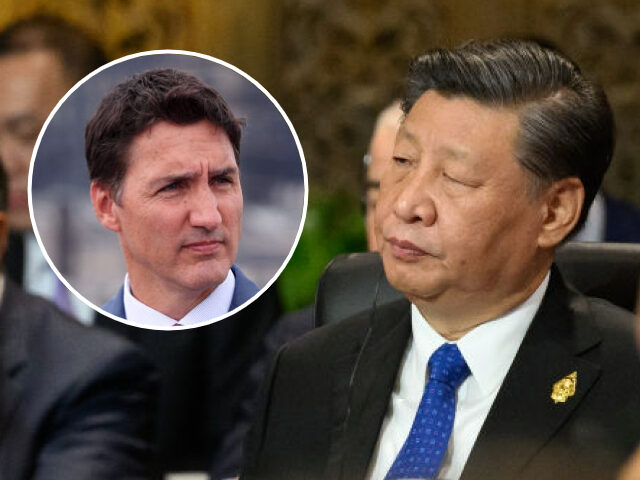Chinese dictator Xi Jinping lectured and threatened Canadian Prime Minister Justin Trudeau for leaking details of a previous conversation to the media in a remarkable on-camera encounter at the G20 summit in Bali, Indonesia, on Wednesday afternoon.
“Everything we said has been leaked to the papers. That’s not appropriate. That’s not the way the conversation was conducted,” Xi told Trudeau in the brief and uncomfortable exchange, captured by a Canadian cameraman from the G20 media pool.
“If you are sincere, we should communicate with each other in a respectful manner, otherwise it will be hard to say what the result will be like,” Xi said menacingly.
Xi spoke in Mandarin, obliging Trudeau to wait for a translation before responding, although Xi’s angry body language was plain to see.
“Well I do believe in free and open and frank dialogue we will continue to have,” Trudeau responded. “And we will continue to work constructively together. But there will be things we will disagree on and we will have to–”
At which point Xi curtly cut him off by saying “Let’s create the conditions first.”
Xi was haranguing Trudeau over a brief, unscheduled conversation they had at a reception on Tuesday. Relations between China and Canada are strained, so Xi had no formal meeting with Trudeau on his agenda for the G20 summit. Trudeau managed to get a few informal minutes with Xi at the reception to get around the snub.
Canadian government sources discussed some of the details of the Xi-Trudeau chat with reporters, evidently drawing Xi’s ire and leading to his confrontation with Trudeau on Wednesday. The UK Guardian speculated Xi was particularly miffed by Canada’s account of Trudeau raising “serious concerns” with him about China’s “interference activities” in Canadian elections.
“Canadian intelligence officials briefed parliamentarians in January that they believe China interfered in the 2019 federal election, and media reports earlier this month alleged that Beijing had funded a clandestine network of candidates,” the Guardian noted.
Canada’s Globe and Mail noted that Xi rarely engages in the kind of obnoxious behavior and “aggressive language” that are sometimes displayed by lower-ranking Chinese Communist officials and diplomats.
“Despite his complaints about their earlier conversation being leaked, Mr. Xi appears to be aware he is being filmed during his own lecture to Mr. Trudeau, walking past the camera as he makes his exit,” the Globe and Mail pointed out.
Canada’s National Post thought Trudeau looked ridiculous after “having his ears boxed by the object of his unrequited affections,” a sarcastic jab at the Trudeau administration’s eagerness to downplay the election-meddling scandal:
It’s pretty good press, because it was so rich: Trudeau getting points for defending Canadian sovereignty after having invited and encouraged Beijing’s sordid influences in Canada’s economic and political life at every opportunity, ever since he was ushered into the Prime Minister’s Office in 2015 by Peter Harder, the head of the Canada-China Business Council, the guy Trudeau hired to lead his transition team and then elevated to lead the government side in the Senate.
So Wednesday, and not for the first time, President Xi decided to take Trudeau down a peg or two. At the G20 summit in Bali, after already snubbing him by taking a pass on a proper bilateral meeting of the kind he’d had with other G7 leaders, Xi publicly berated Trudeau for having gone to the news media with all that bravura about giving Xi a piece of his mind about Beijing’s subversion and interference in Canadian elections.
So it didn’t end up as planned, exactly. It was a bit like December 2017, when Trudeau jetted off to Beijing, expecting to be greeted as a long-lost son entering his father’s house, only to be spurned in his proposal for a free trade agreement with “progressive” flourishes and baubles in it to make it more palatable to the “Canadian values” top of mind among ordinary Canadians. He was sent away empty-handed.
Macdonald-Laurier Institute senior fellow Charles Burton, a onetime employee of the Canadian embassy in China who speaks fluent Mandarin, found Xi’s “it will be hard to say what the result will be like” even more disturbing than a plain reading of the English translation suggests.
“It’s this last phrase which has a threatening aspect to it, the way it was phrased in in Chinese. He normally leaves those kinds of menacing statements to members of the foreign ministry who seem to specialize in this kind of thing,” Burton told Global News, noting the phrase is meant to be interpreted as a threat.
Channel News Asia (CNA) noted that neither the Chinese or Canadian foreign ministries have provided an official readout of the angry conversation between Xi and Trudeau.

COMMENTS
Please let us know if you're having issues with commenting.